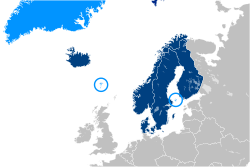
A recent piece in the Scotsman by Lesley Riddoch raises the prospect of Scotland applying for membership of the Nordic Council. Her article can be found here on her own website. This is not a completely new idea. In 2007, the Scottish Left Review contained a piece which also dealt with Scotland and our Nordic neighbours. This can be accessed here.
New idea or not, it is a most welcome suggestion and one I wholeheartedly support. As I see it there are two main reasons for supporting this initiative. The first is the need to enhance Scotland’s voice and representation in international bodies. At present, outwith some sports, Scotland is not represented in her own right. A current case in point is the forthcoming United Nations Climate Change Conference to be held in Copenhagen. The Scottish government requested ministerial representation at this conference as part of the UK delegation, as this is a devolved issue, but the UK government has refused. Thus Scotland’s contribution to this important international issue will go unheard. Or if heard, only at the whim of the UK delegation. This cannot be right.
Membership of the Nordic Council would allow the Scottish government and members of the Scottish Parliament to raise issues and suggest programmes without needing the prior approval of London. Membership would also force the Scottish participants to come with sound proposals which would be subject to serious scrutiny by the other delegations. Sound bite politicking is not the Nordic way. This would be a useful spin-off from membership.
The other major reason for supporting this idea is that exposure to developments in the Nordic countries will help wean Scots, not just MSPs, but journalists and academia, away from their current overdependency on what happens in England. England is and will always remain an important point of reference for Scots, but it should not be, as seems to be the case at present, the only point of reference. Scotland does have a lot in common with the Nordic countries and we should be willing to share our experiences and to learn from them. To take just two very important examples - the role, size and financing of local government and the structure of the health service. Both have been the subject of major debates and legislation in Denmark, Norway and Sweden. I am sure there is much we could learn from the reports and research produced in these countries concerning these two issues.
A brief word on practicalities. The fact that Scotland is, not yet, an independent country, does not prohibit membership. The Nordic Council includes three substate bodies - Greenland, the Faroe Islands and the Åland Islands. Still, the UK government would need to agree to any application for membership. Which, given their recent no to Scottish participation in the Climate Change Conference, is not something they are likely to favour. To overcome this hurdle the Scottish government could do three things. One would be ensure that the application restricted Scottish participation to those areas of government that are currently devolved. This might reassure the UK government somewhat. The second action would be to in the first instance apply for observer status or perhaps associate membership. This would allow all parties - the Nordic Council members, the Scottish government and the UK government - to test the waters as it were. The third action and perhaps the most important vis-à-vis the UK government would be to secure all party support for any application. This should not be too difficult. If the small Åland islands, an autonomous province of Finland, can be a member, without upsetting Finland, then surely a majority of MSPs can be persuaded that membership is in the interests of Scotland, whatever one’s views on the long term constitutional position of the country. All Scots should welcome an opportunity to participate in the Nordic Council and thereby further enhance our continuing links with a part of the world which has historically been of crucial significance to the creation and development of Scotland.
No comments:
Post a Comment